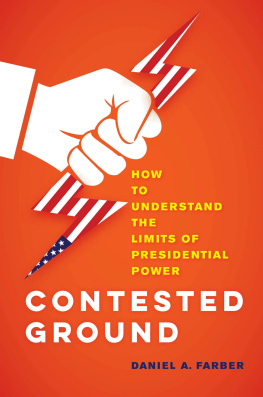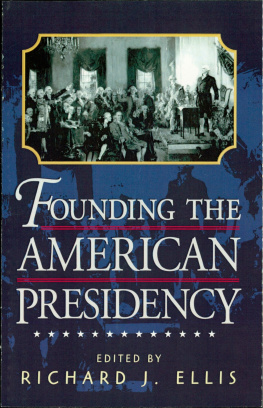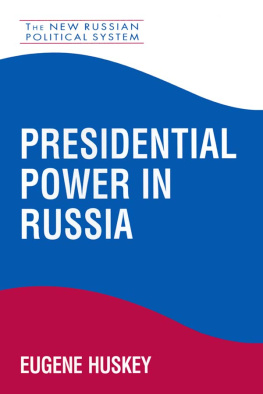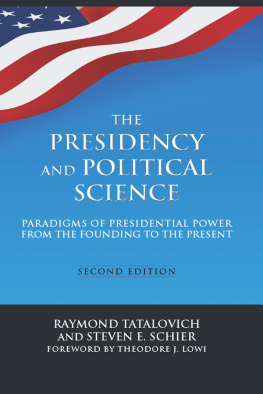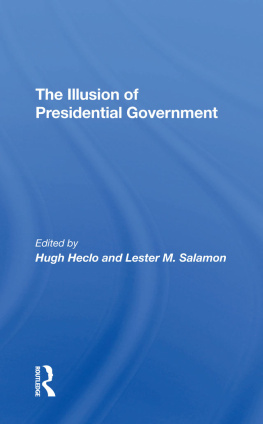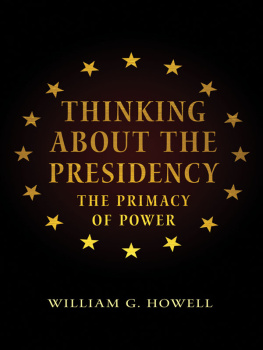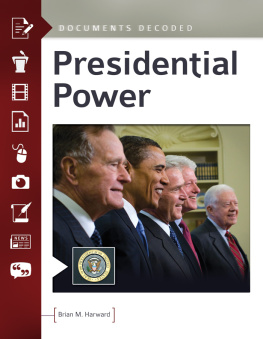Preface
When I drafted this preface, we were in the final weeks of the Trump administration. I have since added a few references to the Biden administration to the text, as well as an afterword dealing with President Trumps second impeachment. Throughout his presidency, Trump utilized his executive powers freely in pursuit of his agenda. For some, he was a hero; for others, a threat to democracy. The controversies over his actions have put the spotlight on issues of presidential power.
During most of my adult life, issues of presidential power have been hotly contested. In my first month of law school, a federal grand jury handed down indictments against participants in the Watergate break-in at Democratic Party headquarters. By the time I graduated, the Watergate scandal growing out of that burglary had brought down President Nixon. It had also led to a dramatic ruling by the Supreme Court on executive privilege. Even before Watergate, the Vietnam War had given rise to furious debate over whether the Imperial Presidency had gotten out of hand.
Although Nixon and Trump bookend much of my career, conflicts over presidential power have arisen again and again in the intervening years. George W. Bush was accused of going beyond the bounds of the Constitution in the War on Terror, while Barack Obama was accused of seizing Congresss lawmaking powers in his efforts to reform immigration policy.
Anyone who lived through those times has strong views about each of these presidents and the legality of their actions. As US politics have become more polarized, the passions surrounding presidential action have risen higher and higher. The views of commentators about presidential power sometimes seem to flip overnight when a new president takes office. Its simply human nature to look kindly on expansive uses of power by the presidents on our side and much more skeptically when the president is on the other side.
To think clearly about presidential power, we have to break free of this psychology. The nature of power is that it can be used for good and for bad. Actions taken by one president serve as precedents for actions taken by another, even if their politics are opposite. Constitutional rules must cover both the presidents we love and those we disdain.
In this book, I try to get beyond the partisan debates and the issues of the moment. I also try to keep in mind readers who come to the subject with views that are the opposite of mine. I do express my own views on many of the issues, but my main goal is not advocacy. Instead, I want readers, whatever their own viewpoints, to understand the deep conflicts over the proper scope of presidential power that in many cases can be traced back to the framing of the Constitution itself.
Anyone who has followed the news over the past decade knows that issues about presidential power cover a broad range. Can the president withdraw from an international agreement unilaterally? What about the presidential use of force such as drone attacks undertaken without authorization from Congress? Are there any limits on presidential power over other parts of the executive branch? Can the president fire a special prosecutor? And what about presidential decisions to stop enforcing immigration laws against whole categories of people? Or, on the other hand, spending money that Congress refused to appropriate in order to build a wall on the US-Mexico border? The media is full of passionate arguments about these issues, but disinterested analysis is far more rare.
Often, the answers to these questions are anything but cut and dried. The arguments not only come to different conclusions, but often start from different assumptions about how to interpret the Constitution. I try to shed light on all these questions, based on Supreme Court precedent and what we know about the views of the Founding Fathers. My hope is that readers with opposing viewpoints will at least gain insight into the complexities of the debate.
Before closing this preface, I need to acknowledge some debts. The book was prompted by an inquiry from my editor at the University of California Press, Maura Roessner. She had seen a presentation on the subject that I gave on Constitution Day at Berkeleys Free Speech Caf and thought it had the germ of a successful book project. I hope the final product will prove her right. My thinking about presidential power has been sharpened by discussions with Mike Paulsen when we were both at the University of Minnesota and John Yoo at Berkeley, both of whom are passionate advocates of the unitary executive theory. My colleague Amanda Tyler helped clarify my thinking about individual rights and executive powers. I also benefited from discussions with Neil Siegel on presidential power, in connection with our book, United States Constitutional Law. My biggest debt, however, is to my wife, Dianne. She carefully edited each chapter, tirelessly streamlining the prose, clearing up ambiguities, and weeding out legal jargon. To the extent that the book is understandable to a general audience, she deserves the bulk of the credit.
Beyond these individuals, there is the much larger group of scholars in the field from whom I have learned. Space prohibits naming them all or even citing all their work in the notes on sources and further reading. I remain grateful to them, even where I disagree, for having done so much to illuminate the subject.
Introduction
Here is a quick multiple choice exam:
Barack Obama ...
(a) was a wise leader who faithfully observed constitutional limits.
(b) abused his powers and violated the Constitution.
Donald Trump ...
(a) was a wise leader who faithfully observed constitutional limits.
(b) abused his powers and violated the Constitution.
It is unlikely that many of us chose the same option for both questions. Such disputes over the constitutionality of presidential actions are nothing new. Many Americans, not just in the South but also in the North, denounced Abraham Lincoln as a dictator wielding unconstitutional authority. Over the past forty years, Presidents Ronald Reagan, George W. Bush, Barack Obama, and Donald Trump stand out as lightning rods for claims of unconstitutional usurpation of power. Two presidents during those four decades were impeached by the House of Representatives (one of them twice), though they both escaped conviction in the Senate.

